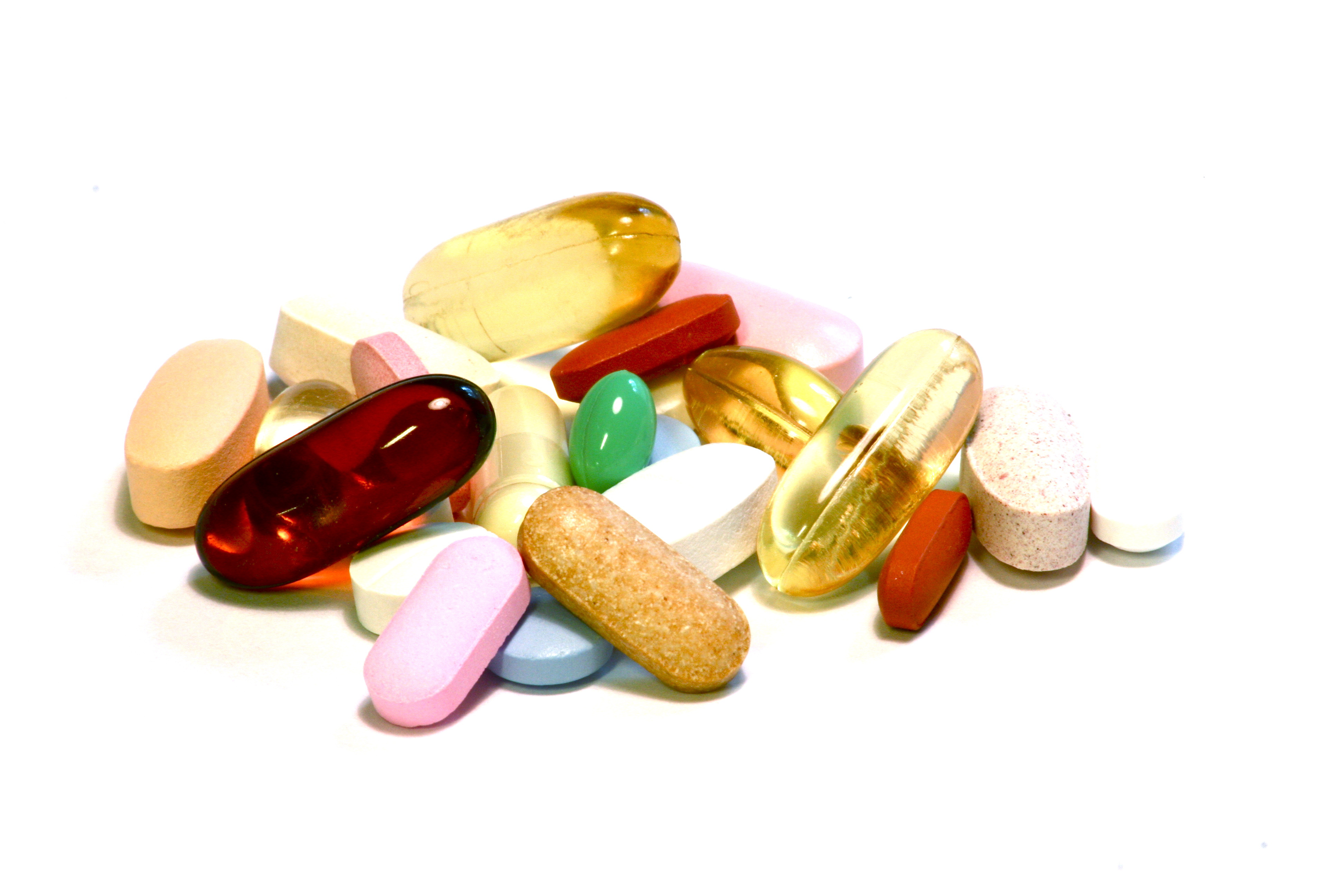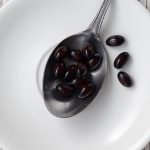Best General Health Daily Vitamin Regimen & My Personal Practice

I personally take over 15 vitamins and supplements per day, but I understand many people would have a difficult time committing to my regimen. I admit to being a “metallophobe,” so I avoid any supplements and vitamins that contain minerals. I believe that some products the FDA (and the public for that matter) consider to be supplements are actually foods. For example, krill oil, spirulina, supercritical extracted perilla and chia, chlorella algae, 1,3-beta glucan from euglena, avocados and German brewer’s yeast are all basically foods.
Here is my advice for a daily vitamin and supplementation aimed at general health and protection. Firstly, I do not recommend multi-vitamins with added minerals or metal salts. All of the food you eat contain metal ions because farmers supplement crops and animals with trace minerals to produce optimal yields and fast times to market. Non-mineral containing vitamins like the old One A Day™ by Bayer are optimal, but may be harder to find today. I am working on a multi-vitamin supplement formulation with NO beta-carotene (a suspected carcinogen in smokers), though I do include astaxanthin, lutein and lycopene. I expect this product will be available to the public by October of 2017.
My Recommended Regimen:
- Vitamin D3 2,000 i.u. per day. Vitamin D is the “sunshine vitamin” and unless you cut lawns for a living in Florida, you are most likely deficient. Vitamin D is especially helpful if you have family histories of joint pain, osteoarthritis or rheumatoid arthritis.
- B Complex. I recommend Sundown Naturals B complex (Dr. Rudi does not accept payment to recommend products) which gives 100% of B1, B2, niacin, B6, folic acid and B12. B12 is probably the most important vitamin on my list. Optionally, you should add additional methyl (not cyano) B12 if you have a low meat or low fish content diet. Methyl B12 is unstable, hard to absorb and mostly destroyed by stomach acid, so please take it with food. I do not recommend sublingual B12, although convenient, because 80% decomposes in the trachea and stomach before it can be absorbed. Actually the best way to get B12 is by taking an enteric coated tablet or by eating meat (meat is a natural “matrix” that protects the B12 in the stomach’s acid environment, so that it can be absorbed in the intestine).
- Krill oil 300 mg to 500 mg (up to 1,000 mg is still acceptable). Do not take fish oil. Use krill oil. I discuss in depth here. Look for krill with a high astaxanthin content. I use Aker Krill oil.
- Astaxanthin 2 mg to 4 mg, Lutein 10 mg and Lycopene 10 mg per day.
- 1,3 beta glucan from euglena algae or German brewer’s yeast to boost the innate immune system.
- Supercritical extracted perilla oil 500 mg or chia oil 600 mg (perilla is preferable)
- Baby aspirin 81 mg (note: this is a drug not a vitamin)
- Ubiquinol (Kaneka, Japan) 100mg daily. Ubiquinol is a form of CoQ10. Persons who take statins must take some form of this supplement.
These recommendations are for the average person and additions should be considered depending on age and gender. For example, women should include an eggshell calcium supplement 2 times a day. I do not recommend ingesting a huge dose calcium “bomb” at once. For pre-menopausal women and vegetarians, iron supplements are a good idea. You should add vitamin C if your diet is low in fruit.
If you have a family history of high blood pressure, heart disease or eye health issues, increase your dose of the carotenoids, astaxanthin, lutein and lycopene, but not beta-carotene.
How to Take Your Vitamins:
Firstly, it is very important to store your vitamins in your refrigerator. Never buy vitamins in bulk. It is best to limit purchases to a 90-day supply.
Take your vitamins with food. Space your intake among meals and do not take a handful of supplements at once. The exception is astaxanthin, lutein and lycopene, which may be taken together. I recommend taking your vitamins with one soft-boiled organic egg (I use “Country Hen” brand organic eggs). By “soft-boiled” I mean cooking an egg in boiling water for no more than 4 minutes and 25 seconds (4 minutes is better) which will maintain a soft yoke. Why a liquid yolk? A fully hardened yolk has most of its nutrients compromised. Get used to eating sunny side up and soft-boiled eggs for optimal health. I recommend no more than one per day. If you prefer you may eat two eggs but discard one yolk. Consuming egg whites alone is silly because you are not consuming the most nutritious part of the egg.
What Supplements Does Dr. Rudi Take?
I am of central European dissent, 70 years old, with a natural propensity towards high triglycerides and cholesterol numbers (before supplementation about 250 for cholesterol and >300 triglycerides), however, my HDL levels were 70 which probably explains why there were no heart attacks in my family history.
I am 6’2” 175 lbs. with very low blood pressure 105/65, no prostate or other health issues, early in life issues with gout but this is genetic (under excreted) and easily controlled with Allopurinol and diet.
In 2006, I developed osteoarthritis (OA) in my hands and left knee, which was so painful I could not press the zip code into the gas pump touch pad without severe pain. This condition led me to discover natural remedies for OA, which include my vitamin and supplement regimen. I stopped experiencing OA pain in 2008.
The only drugs that I take are Zetia, a dietary cholesterol blocker and not a statin (Merck) and Allopurinol. During allergy season I would occasionally take Zyrtec but after using local raw unfiltered honey in my coffee each morning, my adaptive immune system has rendered me allergy free.
I describe my diet as low carb and almost zero sugar. I eat meat but only in very small portions, mostly beef and fish (trout, wild salmon). Generally, I eat minimal chicken because of the bacterial endotoxins (the dead bodies of toxic bacteria) left over after cooking. I also eat very little pork. My diet is rich in berries and vegetables like kohlrabi, broccoli, asparagus, grilled black carrots, tomatoes, and cauliflower. My salad consumption is low to moderate with my favorite being watercress. I use organic olive oil and avocado oil for salads and cooking. I only use vinegar and oil as salad dressing with no creamy or cheesy unhealthy emulsifiers.
Dr. Rudi’s Supplements:
- One gram Aker Krill oil per day (MegaRed). After 2 months my triglycerides went to 125. Cholesterol to 180, which is low enough. My OA was greatly reduced, then disappeared.
- Vitamin B12 (methyl) Vitamin B2 and B6 and folate
- 500 mg super critical whole berry Sea Buckthorn Omega-7 oil
- 500 mg super critical Perilla oil ALA Omega-3
- Baby Aspirin 81 mg
- Just the Berries Black Current extract (1 capsule)
- Astaxanthin 4 mg (Veggie, Now Foods)
- Lutein 10 mg Zeaxanthin 2 mg
- Lycopene 10 mg
- ChiaMax 1 tablespoon suspended in hot water, taken each morning with Go Easy before any food is consumed. Chia Max is a partially defatted Chia fiber
- Go Easy™ from BeWhole.com
- Rhodiola Rosea Extract (1 capsule)
- 1,3 Beta Glucan from Euglena or from German Brewer’s Yeast 250 mg 2X day.
- Spiru-Blue coated organic spirulina, 1 300 mg tablet per day from Dr. Mercola.
- Ubiquinol (Kaneka, Japan) 100mg daily. Ubiquinol is a form of CoQ10. Persons who take statins must take some form of this supplement.


0 Comments